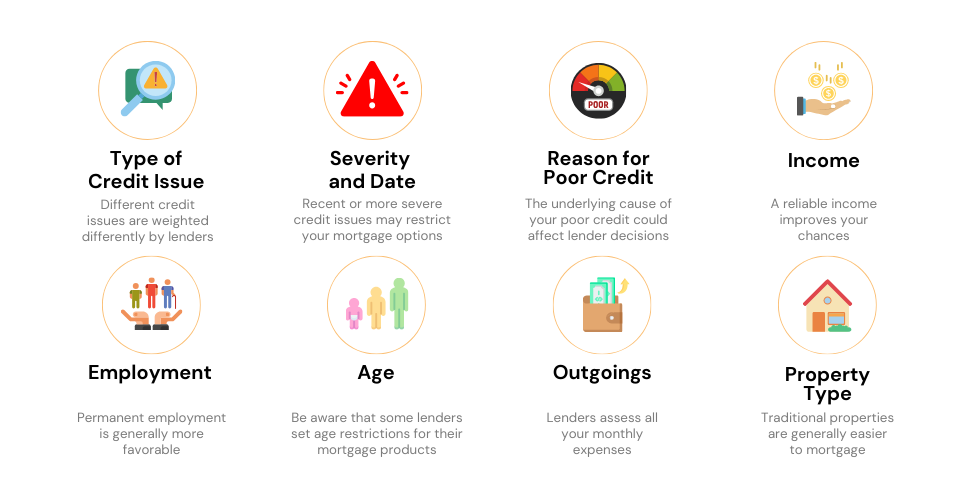- What is a Subprime Mortgage?
- The Pros and Cons of Subprime Mortgages
- When to Consider a Subprime Mortgage
- Factors That Affect Eligibility for a Subprime Mortgage
- Eligibility Criteria for Securing a Subprime Mortgage
- Who are the Subprime Mortgage Lenders in the UK?
- How to Improve Chances of Securing a Subprime Mortgage?
- Considerations Before Applying for a Subprime Mortgage
- Subprime Mortgages for Commercial Premises
- How to Apply for a Subprime Mortgage?
- Key Takeaways
- The Bottom Line
How To Get Subprime Mortgages in the UK: A Complete Guide

History has a funny way of shaping where we end up, and mortgages are no exception.
If you remember the subprime mortgage crisis of 2007-2008, it was a huge shake-up that left lenders no choice but to tighten their rules and be far more careful.
These days, things are a lot different.
While borrowing money isn’t as easy as it was in the early 2000s, that’s not necessarily a bad thing. Those stricter rules have made the mortgage market safer for everyone.
If subprime mortgages have sparked your curiosity, this guide’s here to help. We’ll walk you through the pros and cons, so you’re armed with the facts to make a smart call about your finances.
What is a Subprime Mortgage?
A subprime mortgage is a type of home loan aimed at people who find it hard to get approved by typical mortgage lenders. It’s a good option if your application has been turned down due to a poor credit rating.
You might be in this situation because of past debt problems, which have led to a low credit score. Things like losing your job or dealing with a break-up might have made it hard for you to pay your bills or loan repayments on time.
Other factors might include minor oversights. For example, not being registered to vote or not having enough credit history for lenders to look at.
Even with these challenges, subprime mortgages are still an option and could be the helping hand you need. But they don’t work in the same way as standard mortgages.
That’s where a good broker who knows all about bad credit mortgages comes in handy. They can help you understand what you need to do and guide you towards getting a subprime mortgage.
The Pros and Cons of Subprime Mortgages
As with any financial decision, it’s crucial to understand the potential benefits and risks associated with subprime mortgages.
These home loans can provide significant opportunities but also come with their share of challenges. Let’s explore both aspects:
Pros:
- Home Ownership Access. If you have a troubled credit history, subprime mortgages offer you a chance to buy a home.
- Boost Your Credit Score. By making regular and on-time payments on a subprime mortgage, you can enhance your credit score. Over time, this could lead to improved loan terms.
- Flexible Terms. Subprime mortgages often come with terms and conditions that are more adaptable than those of traditional mortgages. This means you can shape the loan to fit your unique situation.
Cons:
- Increased Interest Rates. Subprime loans usually carry higher interest rates than traditional mortgages. This leads to a higher total repayment over the loan’s lifespan.
- Greater Risk of Foreclosure. If you fail to keep up with repayments, you face a higher risk of the lender repossessing your property.
- Early Repayment Penalties. Some subprime mortgages charge a penalty if you pay off the mortgage sooner than the agreed term.
When to Consider a Subprime Mortgage
There are certain situations where a subprime mortgage could be your best or even only option for buying a home.
For instance, if your credit score is low due to past financial issues, a traditional home loan may not be available to you. In this case, a subprime mortgage could provide the way forward.
Another scenario might be if you’re self-employed and have inconsistent income.
Standard mortgages often require steady, predictable income, which some self-employed individuals may lack. Subprime lenders may be more flexible and consider your overall financial situation, not just your income.
Factors That Affect Eligibility for a Subprime Mortgage
Eligibility for a subprime mortgage isn’t solely based on your credit score. Lenders will consider a variety of factors when assessing your application.
Some key considerations include your current income, your employment history, your debt-to-income ratio, and your down payment capacity.
It’s also worth noting that different credit issues carry different weights. For example, a single late payment on a credit card might not be viewed as seriously as a foreclosure or bankruptcy.
The severity and frequency of past credit problems will also be taken into account.
Eligibility Criteria for Securing a Subprime Mortgage
Different lenders might ask for different things when you apply for a subprime mortgage, but there are some common requirements that you’ll usually need to meet. These usually include:
- Deposit Size – You will usually need a larger deposit for a subprime mortgage compared to a standard one. This is typically around 15-30% of the property’s value.
- Income – You will need to prove that you have a steady income and can afford the mortgage repayments.
- Credit History – While a low credit score doesn’t automatically exclude you, lenders will review your credit history. Any recent major credit issues like bankruptcy or foreclosure may affect your eligibility.
It’s crucial to review and understand these requirements before applying. Remember, lenders want to ensure you can manage the repayments comfortably, and meeting these criteria is part of that process.

Who are the Subprime Mortgage Lenders in the UK?
Subprime mortgage lenders are financial institutions or companies that give mortgages to people with lower credit scores.
These lenders usually work with individuals who may struggle to get a traditional mortgage because of their credit history. They offer chances to own a home that may not be available otherwise, although usually with higher interest rates.
Examples of such lenders in the UK include:
- Precise Mortgages
- Kensington Mortgages
- Aldermore
- Pepper Money
- Bluestone Mortgages
Each of these lenders has its own set of eligibility criteria and loan terms, so it’s important to compare their offerings and understand what you’re agreeing to.
Subprime lenders evaluate each application on its merit. They delve into the reasons behind the poor credit, its recency, and the events that contributed to it.
By doing so, they aim to lend responsibly, ensuring that borrowers can manage repayments, whilst offering an opportunity for home financing when mainstream lenders might decline them.
How to Improve Chances of Securing a Subprime Mortgage?
Here are a few tips to enhance your likelihood of securing a subprime mortgage:
- Check Your Credit Report. Identify any errors and correct them. This can help improve your credit score.
- Pay Down Debts. Lowering your overall debt can improve your debt-to-income ratio, an important factor for lenders.
- Save a Larger Deposit. As mentioned above, a larger deposit can make your application more appealing.
- Steady Employment. Showing a steady income and employment history can reassure lenders of your ability to make repayments.
Considerations Before Applying for a Subprime Mortgage
Before you apply for a subprime mortgage, there are some key considerations to bear in mind to ensure you are making the best decision:
Loan Amount
Think about how much money you need. This shouldn’t necessarily be the maximum amount you can borrow. Instead, aim for a loan that suits your needs and repayment capabilities.
Interest Rates
Subprime mortgages tend to come with higher interest rates due to the perceived risk by the lender. Be sure to compare rates from different lenders and understand the long-term impact of these rates on your repayments.
Repayment Term
This refers to the length of time you will be paying back the loan. A longer-term may reduce your monthly payments, but it will also mean you pay more interest in the long run.
Deposit Size
A larger deposit can potentially lower your interest rate and make your application more appealing to lenders. Consider if you can save a larger deposit before applying.

Subprime Mortgages for Commercial Premises
Just as individuals can secure subprime mortgages for residential properties, businesses too can use this financial tool for commercial premises.
This might be an option for businesses that have had credit issues in the past or startups without a long credit history.
Some things to consider when thinking about a subprime mortgage for commercial premises include:
- Interest Rates – Like residential subprime mortgages, the rates tend to be higher for commercial properties. Businesses should factor this into their budgets.
- Deposit Size – As with residential mortgages, a larger deposit can help reduce the interest rate and monthly repayments.
- Business Credit History – Lenders will look at a business’s credit history rather than an individual’s. Any issues here can impact the terms of the loan.
How to Apply for a Subprime Mortgage?
The application process for a subprime mortgage can be broken down into these basic steps:
- Download Your Credit Score. Before applying, it’s wise to know your credit score to understand your chances of approval. You can get a free copy from various credit reference agencies such as Experian, Equifax, and TransUnion
- Gather Necessary Documentation. This usually includes proof of income, employment history, and personal identification.
- Apply. You can either apply directly with a lender or use a broker.
- Review the Offer. If approved, the lender will send you a mortgage offer. Make sure to review all terms before accepting.
Working with a broker can be really helpful, especially if you’re not sure where to start or want to save time. They can guide you through the process, help you find the best options, and negotiate on your behalf.
That said, it’s important to know that even with a broker’s help, a subprime mortgage isn’t guaranteed.
Lenders will assess your situation carefully, and in some cases, it might not be possible to find a deal.
Being prepared for this can save you time and stress if other options need to be explored.
Key Takeaways
- Subprime mortgages are for people with poor credit but come with higher interest rates and stricter terms.
- Working with a specialist broker can help you find suitable options and navigate the process, but approval isn’t guaranteed for everyone.
- Lenders assess more than just your credit score, considering factors like your income, employment history, debt-to-income ratio, and deposit size.
- A larger deposit (typically 15-30% of the property’s value) and steady income can improve your chances of securing a subprime mortgage.
The Bottom Line
If you’re considering a subprime mortgage, it’s important to weigh the costs and risks against your long-term goals.
While this type of loan can open doors to home ownership, it’s not a decision to rush.
Take the time to understand your options, plan your finances carefully, and get expert advice to make sure it’s the right move for you.
To start, reach out to us. We’ll help you connect with a qualified mortgage specialist who can guide you through the mortgage process.
Get Matched With Your Dream Mortgage Advisor...

Frequently asked questions
Who is eligible for a subprime mortgage in the UK?
Anyone with credit issues might be eligible, but the specific criteria can vary among different lenders.
What interest rates can I expect with a subprime mortgage?
They’re typically higher than traditional mortgages, reflecting the increased risk to the lender.
Can a business get a subprime mortgage?
Yes, businesses with credit issues can secure a commercial subprime mortgage, but the terms may differ from residential loans.
This article has been fact checked
This article was created, checked, and verified by the expert team at Money Saving Guru. Trust us, you’re in good hands.




